|
|
|
Sort Order |
|
|
|
Items / Page
|
|
|
|
|
|
|
| Srl | Item |
| 1 |
ID:
117740
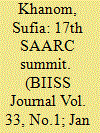

|
|
|
|
|
| Publication |
2012.
|
| Summary/Abstract |
This paper attempts to analyse the discussed issues and outcomes of the seventeenth SAARC Summit which took place in the Maldives from 10-11 November 2011 with a special reference to Bangladesh in the context of regional cooperation. Several significant and strategically important agreements were signed during this Summit with the intention to begin a new era of cooperation among the member countries. Therefore, the Summit declaration adopted several treaties like SAARC Agreement on Rapid Response to Natural Disasters, SAARC Seed Bank, SAARC Agreement on Multilateral Arrangement on Recognition of Conformity Assessment, and the SAARC Agreement on Implementation of Regional Standards. The agreements focused on enhancing and facilitating regional transit and connectivity, economic growth, ensuring energy security, combating terrorism and human trafficking and fight climate change. Though the Summit has come up with some promising mutual agreements, its success will depend on their proper and timely implementation. The lack of political will, problem of poor governance, weak economy and disparity, crisis of political leadership, ethnic, socio-cultural and religious divisions, challenges of non-state actors, transnational security challenges are considered to be the major hindrances to the success of regional integration. The South Asian region should develop its own short, medium, and long-term strategies for economic integration where each stage should be implemented effectively before moving on to the next in order to build a sound foundation for progress. The inclusion of China as 'dialogue partner' would help SAARC to make the tangible progress for regional cooperation in South Asia. The new focus on regional integrations is likely to create exciting opportunities for Bangladesh if it can exploit the synergies based on comparative advantages, investment in cross-border infrastructure projects, address challenges in governance, environmental and social developments.
|
|
|
|
|
|
|
|
|
|
|
|
|
|
|
|
| 2 |
ID:
126294
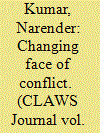

|
|
|
| 3 |
ID:
120434
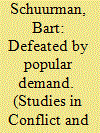

|
|
|
|
|
| Publication |
2013.
|
| Summary/Abstract |
Acquiring and maintaining public support is frequently cited as an important requirement for governments fighting non-state actors. But how exactly can public support influence the course of counterterrorism campaigns and thereby contribute to an escalation or de-escalation of violence? This article argues that public support can provide a mandate for action but that it can also set boundaries for the measures governments and their non-state adversaries can legitimately use. Fluctuations in the quantity and quality of public support for either side can expand or contract these boundaries, potentially instigating marked changes in conflict-related violence levels and affecting the efficacy of government countermeasures.
|
|
|
|
|
|
|
|
|
|
|
|
|
|
|
|
| 4 |
ID:
146574
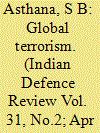

|
|
|
|
|
| Contents |
To flourish a terrorist outfit needs financial and logistics support, political patronage and a
supportive of submissive population, which is the centre of gravity in prospering or combating
terrorism (providing recruitment, intelligence, misguided ideology/religious narrative, media and cyber/technological support). To combat such dangerous terrorist outfits and save innocent population, it is of utmost importance to cut down its support system, its patronage and assistance, sincerely and honestly by every single legitimate power in the world, selective degrading of some organisations such as the ISIS with minimum callateral damages and take onboard some religious leaders, who can support the narrative of peaceful eoexistence for all communities.
|
|
|
|
|
|
|
|
|
|
|
|
|
|
|
|
| 5 |
ID:
116162
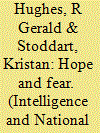

|
|
|
|
|
| Publication |
2012.
|
| Summary/Abstract |
This article explores a number of debates that have dominated intelligence studies since the terrorist attacks of 11 September 2001. It examines a number of inherent tensions, involving individuals and institutions, which threaten the long-term compatibility of the national security state with liberal democracy. The notion as to whether or not the use of extreme coercive measures (such as torture) can ever be justified is examined, as is the question as to whether such measures are self-defeating. The piece examines how liberal democracies seek to protect themselves in the light of rapid changes via a globalised media, the Information Revolution, and the proliferation of advanced technology and weapons of mass destruction amongst state and non-state actors. These issues are discussed with particular reference to the use of intelligence in Afghanistan, Iraq, Iran, North Korea and other global trouble spots. Finally, the article speculates on the future of the increasingly enmeshed relationship between policy-makers, intelligence agencies and the media. It is concluded that, without a clear agenda for the modification of the mechanisms for accountability and oversight, this triangular relationship will, despite its interdependence, be fraught with increasing difficulties.
|
|
|
|
|
|
|
|
|
|
|
|
|
|
|
|
| 6 |
ID:
122760
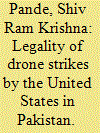

|
|
|
| 7 |
ID:
096860
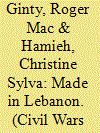

|
|
|
|
|
| Publication |
2010.
|
| Summary/Abstract |
Based on fieldwork and using two case studies from contemporary Lebanon, this article critically appraises indigenous responses to under-development and post-war reconstruction. Indigenous initiatives and methods have become popular among international organisations and international non-governmental organisations in development and reconstruction activities. There is a danger, however, in over-romanticising these approaches. While they hold advantages, they also hold potential risks, especially in the context of a deeply divided society. The article draws on the Waad initiative in Beirut's southern suburbs and the activities of the Future Movement in Tripoli to assess the usefulness of indigenous responses to reconstruction. After outlining the cases, four issues are discussed: the politicisation of indigenous assistance in deeply divided societies; the extent to which indigenous approaches to reconstruction can be participatory; the extent to which internationally-supported indigenous assistance can be usefully labelled as 'indigenous'; and the ability of non-state social actors to reinforce or undermine the state. Although drawing on Lebanese examples, it is hoped that the issues raised have relevance to other cases (especially in deeply divided societies) and connect with policy debates on the desirability of indigenous responses to reconstruction and development challenges.
|
|
|
|
|
|
|
|
|
|
|
|
|
|
|
|
| 8 |
ID:
121649
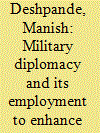

|
|
|
| 9 |
ID:
120920
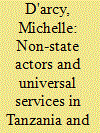

|
|
|
|
|
| Publication |
2013.
|
| Summary/Abstract |
In recent years over half of all African states have re-introduced some form of universal basic service provision, though many more have done so in education when compared with health. Most existing explanations of these developments have emphasised the importance of demand side factors associated with democratisation. This paper argues that while democratisation has been important in generating pressure for reform, alliances with actors outside the state - such as donors and non-state service providers - have been the critical enabling factor allowing weak states to overcome their capacity constraints and respond. Two illustrative case studies are used to show how variation in alliance opportunities has led to differences in outcomes both between social sectors and across countries. An inter-sector comparison of health and education policy in Tanzania shows how a difference in donor policy preferences between sectors - donors having converged behind the principle of universal primary education but not universal healthcare - has led to variation in alliance opportunities and hence policy outcomes. A 'least likely' case of healthcare reform in Lesotho shows how an alliance with a non-state provider has made difficult reforms possible.
|
|
|
|
|
|
|
|
|
|
|
|
|
|
|
|
| 10 |
ID:
190127
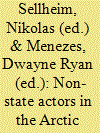

|
|
|
|
|
| Publication |
Switzerland, Springer, 2022.
|
| Description |
xvi, 326p.hbk
|
| Series |
Springer Polar Sciences
|
| Standard Number |
9783031124587
|
|
|
|
|
|
|
|
|
|
|
|
Copies: C:1/I:0,R:1,Q:0
Circulation
| Accession# | Call# | Current Location | Status | Policy | Location |
| 060351 | 355.0335/SEL 060351 | Main | On Shelf | Reference books | |
|
|
|
|
| 11 |
ID:
123829
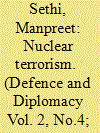

|
|
|
| 12 |
ID:
093412
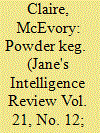

|
|
|
| 13 |
ID:
114168
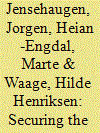

|
|
|
|
|
| Publication |
2012.
|
| Summary/Abstract |
Between early 1947 and May 1948, the Zionist movement went from being a non-state actor representing the minority population within the territory of the British Mandate of Palestine to establishing the State of Israel, which would be recognised almost instantaneously by the world's two Superpowers, the United States and the Soviet Union. Such a result, however, was never a given. What processes allowed a non-state actor, the Zionist movement, to secure international acceptance for the creation of a Jewish state in highly ambiguous circumstances? This analysis explores the dual-track adopted by the Zionist movement, whereby it worked to create facts on the ground within Palestine whilst securing support for its state-building project at the international level. By establishing state-like institutions in Palestine whilst building international support, the Jewish Agency was able to secure for itself a unique place from which to declare statehood.
|
|
|
|
|
|
|
|
|
|
|
|
|
|
|
|
| 14 |
ID:
126293
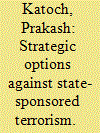

|
|
|
| 15 |
ID:
112644
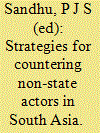

|
|
|
|
|
| Publication |
New Delhi, Vij Books India Pvt Ltd., 2011.
|
| Description |
180p.
|
| Standard Number |
9789380177625
|
|
|
|
|
|
|
|
|
|
|
|
Copies: C:1/I:0,R:0,Q:0
Circulation
| Accession# | Call# | Current Location | Status | Policy | Location |
| 056522 | 355.033054/SAN 056522 | Main | On Shelf | General | |
|
|
|
|
| 16 |
ID:
150606
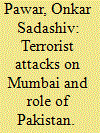

|
|
|
|
|
| Summary/Abstract |
Today, terrorism has become a global phenomenon. It has been observed that most of the states in the world are affected by terrorist attacks. They have been challenged by the global non state actors and dispersed fanatical terrorist networks that have capacity to wage war internationally. It poses a real threat to the very survival of humanity and is set to deprive humankind of its most highly prized treasure of peace, security and understanding among nations which are the key underpinnings of sustainable progress.
|
|
|
|
|
|
|
|
|
|
|
|
|
|
|
|
|
|
|
|
|